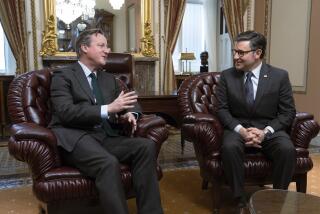Diplomacy : For Britain’s New Leader, a ‘Coming Out’
- Share via
LONDON — John Major is making his first visit to Washington as British prime minister with a goal of reaffirming the “special relationship” between Britain and the United States, say sources in his office at 10 Downing Street.
The first order of business this morning for the 47-year-old leader, who arrived in Washington late Thursday, will be to appear on U.S. television networks to establish himself as a heavyweight successor to Margaret Thatcher, who was widely respected in U.S. government circles.
Thatcher, who resigned last month after a challenge to her Conservative Party leadership, had an especially close working relationship with President Ronald Reagan and has continued to offer the staunchest allied support for President Bush’s foreign policy. Major has come to reassure Americans that that will not change.
The main work of Major’s trip will be done at “informal talks” this afternoon and evening with President Bush at Camp David, Md. But before seeing Bush, he will meet Vice President Dan Quayle and lunch with Democratic and Republican congressional leaders. He returns to London on Saturday.
In discussing operations in the Persian Gulf, Major is expected to reinforce Bush’s view that Iraqi President Saddam Hussein should not be allowed to get away with merely a partial withdrawal from Kuwait, the Downing Street sources say.
Major believes that accepting a partial withdrawal could damage public support for Operation Desert Shield in the Persian Gulf and that, in any case, Hussein is not a man to be trusted.
The British ambassador to Iraq, Harold Walker, has warned that, at the last minute, Hussein may offer to withdraw from Kuwait city but hold onto other territory as a way of undermining the Arab-Western coalition arrayed against him.
Bush is expected to welcome Britain’s firm support for American policies in the gulf that are designed to force Hussein to withdraw.
Otherwise, Major will be bringing to Bush a first-hand European view of recent developments, including the moves made at last week’s summit in Rome toward establishing a closer political and monetary union among the 12 members of the European Community.
The prime minister will also be soliciting the President’s views on the development of the European Community as it nears its goal of creating a single market in 1992.
Although Major’s aides acknowledge that Thatcher was immensely popular in the United States, they point to his strong showing in recent British polls, and to a perception that he has slipped smoothly into his leading role. And they believe Major and Bush will hit it off well.
Major has visited the United States several times. U.S. officials and TV viewers will see in him a more affable, less strident and less opinionated prime minister than his predecessor.
Aides say he also is accustomed to working breakfasts, informal first-name relationships and other aspects of the American style.
“I think he will fit in very well with the way Americans do business,” said one of the Downing street sources.
More to Read
Sign up for Essential California
The most important California stories and recommendations in your inbox every morning.
You may occasionally receive promotional content from the Los Angeles Times.













